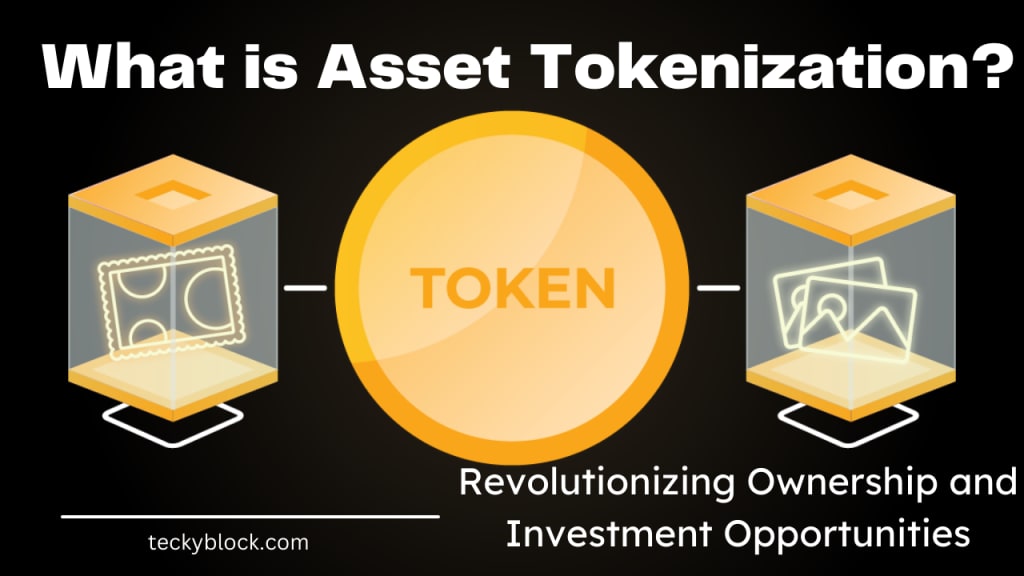What is Asset Tokenization? Revolutionizing Ownership and Investment Opportunities
Learn about the revolutionary concept of asset tokenization and how it's changing the investment landscape. Discover the benefits, challenges, and potential of this technology in our comprehensive guide.

Introduction
In today's ever-evolving financial landscape, asset tokenization has emerged as a revolutionary concept that is transforming the way we own and invest in assets. This comprehensive guide will provide you with an in-depth understanding of asset tokenization, its importance, and the opportunities it presents.
Definition and Overview of Asset Tokenization
Asset tokenization refers to the process of digitizing real-world assets and representing them as tokens on a blockchain. These tokens, backed by physical assets such as real estate, artwork, or investment funds, provide fractional ownership rights to investors. The tokens are governed by smart contracts, which automate the transfer of ownership and ensure compliance with predefined rules.
Importance and Relevance of Asset Tokenization
Asset tokenization holds immense importance in today's financial landscape due to its potential to democratize investments and unlock previously inaccessible opportunities. By breaking down large assets into smaller tokenized units, asset tokenization enables increased liquidity and fractional ownership. This means that investors can participate in high-value assets with smaller amounts of capital, promoting financial inclusion and expanding investment possibilities.
Understanding Asset Tokenization
How Asset Tokenization Works
Asset tokenization relies on blockchain technology, which acts as a decentralized ledger to record and verify transactions. Through this process, physical assets are divided into digital tokens that can be traded on blockchain-based platforms. The tokens represent fractional ownership, allowing investors to buy, sell, and trade these digital assets.
Key Components: Blockchain Technology and Smart Contracts
Blockchain technology serves as the foundation for asset tokenization. It ensures transparency, immutability, and security in transactions. Smart contracts, built on the blockchain, automate the execution of predefined conditions and rules, eliminating the need for intermediaries and reducing transaction costs.
Types of Assets Suitable for Tokenization
A wide range of assets can be tokenized, including real estate properties, investment funds, artwork, collectibles, and financial instruments such as stocks and bonds. The suitability of an asset for tokenization depends on factors such as market demand, regulatory considerations, and the potential for fractional ownership.
Benefits of Asset Tokenization
Increased Liquidity and Fractional Ownership
Asset tokenization brings increased liquidity to traditionally illiquid assets such as real estate and artwork. Fractional ownership allows investors to buy fractional shares of assets, providing more flexibility and diversification.
Enhanced Accessibility to Previously Illiquid Assets
Tokenization enables broader accessibility to assets that were previously limited to high-net-worth individuals or institutional investors. It opens up new investment opportunities for individuals with smaller capital, promoting inclusivity in the investment landscape.
Streamlined Transaction Processes and Reduced Costs
Asset tokenization simplifies and automates transaction processes through smart contracts, reducing the need for intermediaries and associated costs. It streamlines asset transfers, ownership transfers, and other administrative tasks, improving efficiency and reducing operational expenses.
Global Accessibility and 24/7 Trading
Tokenized assets are not bound by geographical restrictions or market hours. They can be traded globally and are available for trading 24/7, allowing investors to seize opportunities and react to market movements more effectively.
Transparency and Reduced Fraud Risk
The transparency offered by blockchain technology ensures that asset transactions and ownership records are securely stored and can be audited. This reduces the risk of fraud and enhances trust among market participants.
Challenges and Considerations
Regulatory Landscape and Compliance Requirements
The regulatory landscape surrounding asset tokenization is still evolving. Compliance with existing regulations and navigating new regulatory frameworks can be challenging. Market participants need to stay informed and work closely with legal and regulatory experts to ensure compliance with applicable laws.
Security and Privacy Concerns
As with any digital system, asset tokenization raises security and privacy concerns. The use of blockchain technology provides inherent security features, such as cryptographic encryption and decentralized storage. However, ensuring the integrity and confidentiality of sensitive information, such as ownership details, remains crucial. Implementing robust security measures and encryption protocols is necessary to safeguard against unauthorized access and protect investor data.
Market Acceptance and Adoption Challenges
The adoption of asset tokenization faces challenges related to market acceptance and awareness. Traditional financial systems and industries may be resistant to change or unfamiliar with this innovative concept. Educating market participants about the benefits, risks, and regulatory considerations of asset tokenization is crucial for broader acceptance and adoption. Collaboration among industry stakeholders, including financial institutions, regulators, and technology providers, is essential to establish a supportive ecosystem and drive widespread adoption.
Real-World Examples and Use Cases
Tokenization of Real Estate Properties
Real estate, a traditionally illiquid asset class, can greatly benefit from tokenization. Fractional ownership of real estate properties allows investors to diversify their portfolios and gain exposure to this asset class with smaller investments. Tokenized real estate platforms enable efficient and transparent property transactions, reducing friction in the buying and selling process.
Tokenized Investment Funds and Portfolios
Asset tokenization provides an opportunity to revolutionize the investment fund industry. Tokenizing investment funds allows for increased liquidity, streamlined fund management processes, and enhanced transparency. Investors can easily buy and sell fractional shares of funds, reducing entry barriers and enabling greater flexibility in portfolio management.
Artwork and Collectibles as Tokenized Assets
Tokenization offers a unique way to invest in artwork and collectibles. By digitizing these assets, investors can gain fractional ownership, enabling broader participation in the art market. Tokenization also enhances provenance tracking, authenticity verification, and transparent ownership transfers, mitigating concerns related to counterfeit art and ensuring a trusted marketplace.
Tokenization in the Financial Industry
Asset tokenization has the potential to disrupt various aspects of the financial industry, including stock trading, bond issuance, and lending. Tokenizing stocks and bonds can facilitate faster and more efficient trading, eliminating the need for intermediaries and reducing costs. Tokenization also opens up opportunities for peer-to-peer lending and the creation of new financial instruments.
Future Outlook and Potential
Growth Opportunities and Market Projections
The future of asset tokenization looks promising, with significant growth opportunities and positive market projections. The global market for tokenized assets is expected to witness substantial growth, driven by increasing investor demand, advancements in blockchain technology, and regulatory developments. Market reports suggest that the market size for tokenized assets could reach billions or even trillions of dollars in the next decade.
Integration with Emerging Technologies (e.g., AI, IoT)
Asset tokenization is expected to integrate with emerging technologies such as artificial intelligence (AI) and the Internet of Things (IoT). The integration with AI can enhance asset valuation, risk assessment, and investment decision-making processes. IoT devices can provide real-time data on asset performance, usage, and condition, enabling more accurate asset tokenization. The convergence of asset tokenization with AI and IoT will unlock new possibilities for automated asset management, predictive analytics, and personalized investment solutions.
Impact on Traditional Financial Systems and Industries
Asset tokenization has the potential to reshape traditional financial systems and industries. By eliminating intermediaries and reducing transaction costs, tokenization can disrupt traditional financial processes and create more direct connections between asset issuers and investors. This disintermediation can lead to increased efficiency, faster settlement times, and improved market liquidity. Traditional industries such as real estate, banking, and asset management are likely to experience significant transformation as asset tokenization gains traction.
Conclusion
In conclusion, asset tokenization represents a revolutionary concept that is revolutionizing ownership and investment opportunities. The benefits of increased liquidity and fractional ownership, enhanced accessibility to previously illiquid assets, streamlined transaction processes, global accessibility, transparency, and reduced fraud risk make asset tokenization an attractive option for investors. However, it is essential to consider the challenges associated with regulatory compliance, security, privacy, and market acceptance.
Real-world examples and use cases demonstrate the practical applications of asset tokenization in various industries, including real estate, investment funds, artwork, and the financial sector. These examples highlight the potential for increased liquidity, transparency, and efficiency in asset transactions.
Looking ahead, asset tokenization holds significant growth opportunities and market projections. Integration with emerging technologies such as AI and IoT will further enhance its capabilities and open up new avenues for investment. The impact on traditional financial systems and industries will be substantial, leading to a more streamlined and inclusive investment landscape.
In conclusion, asset tokenization has the potential to revolutionize the way we own and invest in assets. It offers numerous benefits, including increased liquidity, fractional ownership, and enhanced accessibility. While there are challenges to overcome, such as regulatory compliance and market acceptance, the future outlook for asset tokenization is promising. To stay ahead in this evolving landscape, it is crucial for investors, financial institutions, and regulators to explore and engage with asset tokenization opportunities.
We invite you to dive deeper into the world of asset tokenization, educate yourself on the latest developments, and explore the potential benefits it offers. Embracing this transformative technology can help you unlock new investment opportunities and stay at the forefront of the ever-changing financial landscape.
Take the leap into asset tokenization and discover the revolutionary potential it holds for ownership and investment. Start exploring today and be part of the future of finance.
About the Creator
TeckyBlock
Learn about blockchain technology, cryptocurrency, NFT and metaverse in here. please visit https://teckyblock.com for further information.






Comments
There are no comments for this story
Be the first to respond and start the conversation.